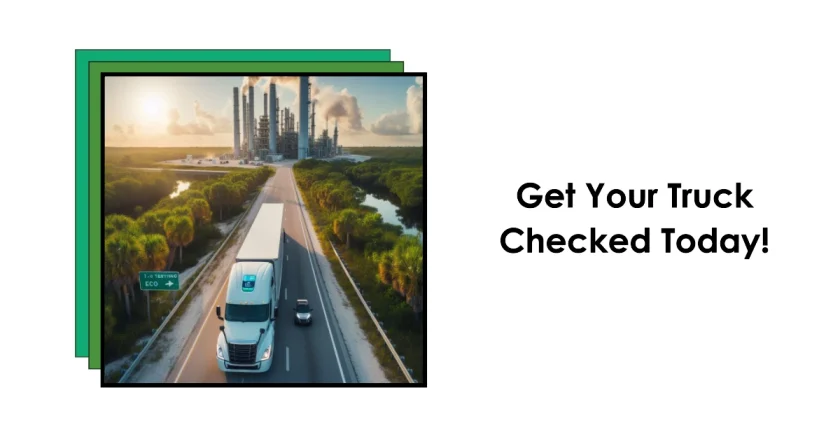Clean Truck Check in Florida: CARB program
The trucking industry plays a vital role in the American economy, but it also contributes significantly to air pollution. In an effort to curb emissions and promote cleaner air, California Air Resources Board (CARB) implemented the Clean Truck Check program. This program targets heavy-duty trucks and aims to reduce harmful pollutants like nitrogen oxides (NOx) and particulate matter (PM) through mandatory emissions testing and reporting.
While the Clean Truck Check program has gained traction in California and influenced regulations nationwide, Florida currently does not have a similar mandatory program. This begs the question: Could a Clean Truck Check program be implemented in Florida, and what impact might it have?
Clean Truck Check: Understanding the Program
The California Clean Truck Check program applies to most diesel and alternative fuel heavy-duty vehicles with a Gross Vehicle Weight Rating (GVWR) exceeding 14,000 pounds. The program consists of three key phases:
- Phase 1 (Implemented January 1, 2023): Roadside monitoring systems began identifying high-polluting vehicles based on emissions readings.
- Phase 2 (October 1, 2023 – December 31, 2023): A three-month open reporting period allowed fleet owners to register their vehicles in the Clean Truck Check database and pay a $30 annual compliance fee. (This deadline has been extended to December 31, 2024)
- Phase 3 (Ongoing): Fleets must regularly test their vehicles’ emissions and submit the results electronically to CARB. Vehicles that fail to meet emission standards must undergo repairs and retesting.
Florida’s Regulatory Landscape for Trucks
Florida, unlike California, does not have mandatory emissions testing for heavy-duty trucks. However, the state does offer incentives for clean vehicles. Drivers of Low Emissions Vehicles (LEVs), including hybrids, can access High Occupancy Vehicle (HOV) lanes regardless of the number of passengers. This program encourages the use of cleaner technologies in the trucking industry.
Important Note for Florida Truck Owners and Drivers Traveling to California
Since Florida lacks a Clean Truck Check program, truck owners and drivers traveling to California with vehicles exceeding 14,000 pounds GVWR must comply with CARB regulations. Here’s what they can do:
- Register with CARB: Visit the CARB website (https://ww2.arb.ca.gov/) and register their vehicle in the Clean Truck Check database.
- Locate a CARB-Authorized Test Station: Click here for list
- Schedule a Test at a CARB-Authorized Station: Before entering California, schedule an appointment for an emissions test at a certified station in Florida, or in a bordering state, such as Georgia, Texas, or Arizona.
- Pass the Emissions Test: The test will measure the vehicle’s emissions to ensure compliance with California’s standards.
- Keep Records: Maintain documentation of the test results for presentation to California authorities if requested.
Arguments for a Clean Truck Check Program in Florida
Despite the lack of a current program, several factors suggest that a Clean Truck Check program could benefit Florida:
- Environmental Impact: Florida faces air quality challenges, particularly in urban areas. A Clean Truck Check program could significantly reduce emissions from heavy-duty trucks, leading to cleaner air and improved public health.
- Public Health Benefits: Exposure to air pollution from trucks can cause respiratory problems, heart disease, and other health issues. Reducing emissions can improve public health outcomes for residents across the state.
- Economic Advantages: Cleaner trucks can be more fuel-efficient, leading to cost savings for trucking companies. Additionally, Florida’s reputation for environmental consciousness could attract businesses that prioritize sustainability.
- Alignment with National Trends: As stricter emission regulations are implemented nationwide, Florida could benefit from having a program in place to ensure compliance and avoid potential future hurdles.
Challenges to Implementing a Clean Truck Check Program in Florida
While a Clean Truck Check program offers potential benefits, there are also challenges to consider:
- Industry Pushback: The trucking industry may resist additional regulations and the costs associated with emissions testing and potential repairs.
- Infrastructure Needs: Implementing a Clean Truck Check program requires establishing testing facilities and a robust data management system, which necessitates investment.
- Enforcement Challenges: Enforcing the program across a large state with a significant trucking industry could be complex and require dedicated resources.
